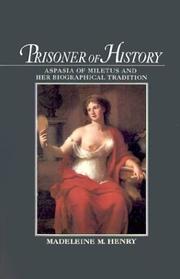| Listing 1 - 3 of 3 |
Sort by
|
Book
ISBN: 9780521192668 9780511750960 9781107692329 9780511750229 0511750226 9780511743672 051174367X 051175096X 0521192668 1107204348 128263089X 9786612630897 0511749481 0511742606 0511744765 1107692326 Year: 2010 Publisher: Cambridge : Cambridge University Press,
Abstract | Keywords | Export | Availability | Bookmark
 Loading...
Loading...Choose an application
- Reference Manager
- EndNote
- RefWorks (Direct export to RefWorks)
Edith Foster compares Thucydides' narrative explanations and descriptions of the Peloponnesian War in Books One and Two of the History with the arguments about warfare and war materials offered by the Athenian statesman Pericles in those same books. In Thucydides' narrative presentations, she argues, the aggressive deployment of armed force is frequently unproductive or counterproductive, and even the threat to use armed force against others causes consequences that can be impossible for the aggressor to predict or contain. By contrast, Pericles' speeches demonstrate that he shared with many other figures in the History a mistaken confidence in the power, glory, and reliability of warfare and the instruments of force. Foster argues that Pericles does not speak for Thucydides, and that Thucydides should not be associated with Pericles' intransigent imperialism.
Pericles, --- Thucydides. --- Thucydide --- Thukydides --- Thoukudides --- Pericle, --- Perikl, --- Perikles, --- Perykles, --- Greece --- History --- Thucydides --- Arts and Humanities --- Tucidide --- Fukidid --- Tucídides --- Thoukydidēs --- תוקידידיס --- Θουκυδίδης
Book
ISBN: 9780521765930 0521765935 9780511642326 9781107415409 9780511641794 0511641796 0511642326 051163935X 9780511639357 0511700245 9780511700248 1107208831 9781107208834 1107415403 9786612386640 6612386649 0511638280 9780511638282 0511640439 9780511640438 Year: 2010 Publisher: Cambridge ; New York : Cambridge University Press,
Abstract | Keywords | Export | Availability | Bookmark
 Loading...
Loading...Choose an application
- Reference Manager
- EndNote
- RefWorks (Direct export to RefWorks)
Thucydides, Pericles, and the Idea of Athens in the Peloponnesian War is the first comprehensive study of Thucydides' presentation of Pericles' radical redefinition of the city of Athens during the Peloponnesian War. Martha Taylor argues that Thucydides subtly critiques Pericles' vision of Athens as a city divorced from the territory of Attica and focused, instead, on the sea and the empire. Thucydides shows that Pericles' reconceputalization of the city led the Athenians both to Melos and to Sicily. Toward the end of his work, Thucydides demonstrates that flexible thinking about the city exacerbated the Athenians' civil war. Providing a thorough critique and analysis of Thucydides' neglected book 8, Taylor shows that Thucydides praises political compromise centered around the traditional city in Attica. In doing so, he implicitly censures both Pericles and the Athenian imperial project itself.
City and town life --- Historiography. --- History. --- Thucydides. --- Pericles, --- Athens (Greece) --- Greece --- Politics and government. --- History --- Politics and government --- Historiography --- City life --- Town life --- Urban life --- Sociology, Urban --- Pericle, --- Perikl, --- Perikles, --- Perykles, --- Aḟiny (Greece) --- Atene (Greece) --- Atʻēnkʻ (Greece) --- Ateny (Greece) --- Athen (Greece) --- Athēna (Greece) --- Athēnai (Greece) --- Athènes (Greece) --- Athinai (Greece) --- Athīnā (Greece) --- Αθήνα (Greece) --- Arts and Humanities

ISBN: 0195087127 0585372462 9780585372464 9780195087123 160129963X 9781601299635 1280442328 9781280442322 9786610442324 6610442320 0195358651 0197705006 Year: 2023 Publisher: New York ; Oxford University Press,
Abstract | Keywords | Export | Availability | Bookmark
 Loading...
Loading...Choose an application
- Reference Manager
- EndNote
- RefWorks (Direct export to RefWorks)
Aspasia of Miletus, next to Sappho and Cleopatra, is one of the best known women of the classical world. This study traces the construction of Aspasia's biographical tradition and shows how it has prevented her from taking her rightful place as a contributor to the ancient world.
Mistresses --- -Women in politics --- Lovers (Mistresses) --- Concubinage --- Paramours --- Biography --- Aspasia --- Pericles --- Aspazja --- Aspasie --- Aspasia de Mileto --- De Mileto, Aspasia --- Mileto, Aspasia de --- Aspasia, --- Greece --- History --- -Mistresses --- Women --- Human females --- Wimmin --- Woman --- Womon --- Womyn --- Females --- Human beings --- Femininity --- Political activity --- Aspasia. --- Pericles, --- Pericle, --- Perikl, --- Perikles, --- Perykles, --- Athens (Greece) --- Women in politics
| Listing 1 - 3 of 3 |
Sort by
|

 Search
Search Feedback
Feedback About UniCat
About UniCat  Help
Help News
News